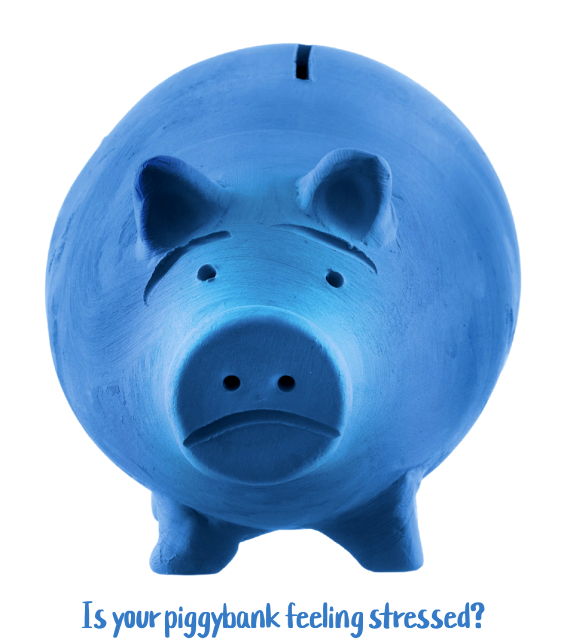As I was thinking about what to write about today, it occurred to me that while stress is a major cause of high blood pressure, money is a major cause of stress.
I'm not great at algebra, (in fact, I barely
made it thru high school algebra, and that was WITH tutoring!) but it seems to
me that equation would be stress + money issues = high blood pressure.
Note that the equation includes
"money issues." Wouldn't that be nice if the issue was too much to
spend? I'm still working on having that particular
scenario!
You may or may not be surprised at the percentage of Americans who are stressed about money.
A survey done in 2014 by the American Psychological Association showed that 72% of Americans were stressed about money sometimes, and 26% actually had money as their major stressor most or even all of the time.
So if financial woes are big issues for you, you are not alone!
What Are the Effects of Financial Stress?
In 2017, Dr. Dennishen Govender presented research to the 18th Annual Congress of the South African Heart Association regarding a study on how likely psychosocial issues (financial stress being one of them) were the cause of heart attacks..
More specifically, he wanted to learn how issues such as work stress, financial stress, depression and anxiety affected the chances of having a heart attack.
The participants were 106 people who were in the hospital because of a heart attack. Dr. Govender had them fill out forms asking about the various stressors in their lives.
There were four categories including:
- No financial stress
- Mild financial stress
- Moderate financial stress
- Significant financial stress
Here's What Financial Stress Can Do to You
The results of the study showed that if you have significant financial stress, you have 13 times more chances of having a heart attack than people with little or no stress!
Bills + Not Enough Money = Stress
So what do you do when you have more
bills to pay than you do money to pay those bills? We all know how quickly
those bills add up:
- The electric bill in summer (unless you want to sweat thru 3-4 months a year)
- Heating bill in winter (or risk turning blue from the cold)
- Medical bills
- Car repair bills or buying a new car
- Mortgage or rent
- Phone bill (unless you want to live as a hermit)
- Who knows what else will crop up – appliances break, etc.
Five Tips for Dealing with Financial Stress
- Spend less (unless you've already gotten your spending down to where you don't go to Starbucks, you wash your own car or just let it looard leakage of your money.
- Try not to borrow money from a relative and risk not being able to pay back and causing a rift in that relationship
- Find a way to make more money with a second job, third job, or home business.
- If you have a lot of bills, whatever you do, don't ignore them. Call the company you owe and see if they will work with you. Sometimes a credit card company or car loan company will let you skip a month and just pay the interest for that month.
- Dave Ramsey says to make a list of your bills from smallest to largest, no matter the interest rate. While you make just the minimum payments on everything but the smallest bill, put as much money as you can toward it and get it paid off. Then do the same thing for the next smallest bill.
Make Additional Income at Home
Earning additional income at home could be helpful to you, especially if you already have a job taking up 8 or more hours of your day.
The best scenario would be if you could find something to do that you are passionate about...that would help you to motivate you each day.
You may not be
able to see money in your bank account as soon as yesterday, if you know what I
mean, but with planning, consistency, and focus on achieving your result, you should be
able to improve your situation.
I'm being honest here. You have to find a passion for something you believe in, and work on it even when you don't feel like it. As Mike Healy, a man who has climbed to the top of at least three different networking companies says,  "Do today what others won't, so you can live tomorrow like others can't."
"Do today what others won't, so you can live tomorrow like others can't."
 "Do today what others won't, so you can live tomorrow like others can't."
"Do today what others won't, so you can live tomorrow like others can't."Think about what you love, what you know,
and how it can help other people. Then share with other people what you know.
You may have heard my story: I am
passionate about helping people find ways to get healthier. The issue I've
focused on is blood pressure. But I'm passionate about other ways to improve
health as well.
There were so many things to learn to put
it all in motion that it took a good year for me to learn what I know, AND I'm
still learning.
Action Steps Toward Lowering Financial Stress
The main thing if you have money issues, or even if you want to make life a little easier with some extra money, is to take action.
- Look at your situation and decide exactly what the issue is
- Don't stress (easier said than done, I know!)... Instead, look for a solution
- Implement action steps toward that solution
Hopefully, this gets you on the road to having
to stress less about money issues in your life and running toward more time for fun
with your friends and family.
Here's to less stress and more money for you!

